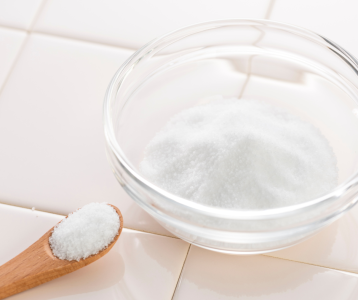The $3 pantry secret: A powerhouse cleaner for kitchens, bathrooms, and more
We take great pride in keeping our homes neat and tidy—after all, there's nothing quite as satisfying as a nice, spotless home!
Unfortunately, cleaning surfaces, particularly in the kitchen and the bathroom, can be a hassle.
To make things worse, some conventional cleaning products contain harsh chemicals that could spell further trouble for those with sensitive skin.
Thanks to modern research, however, there’s a secret weapon to add more firepower to our cleaning routine, and it’s something that’s been hiding in our pantry all along.
Joanne Heaney, Food Technologist for McKenzie's Food, recently introduced citric acid as an overlooked yet effective cleaning agent, highlighting its capacity to lower the pH levels of bacteria.
‘This enables it to penetrate the cell wall of mould, mildew and bacteria, which can then be easily wiped or rinsed away with water. It’s great for disinfecting and general cleaning,’ she told 9Honey Living.
Which surfaces are best cleaned with citric acid?
In the bathroom, you can apply citric acid to the toilet, non-brass fixtures, shower screens, and bathtubs.
While in the kitchen, it’s ideal for descaling the kettle, sprucing up microwaves, tidying benches, cleaning sinks, and removing container stains.
You might also consider using citric acid on windows and mirrors.
What should you avoid cleaning with citric acid?
According to the cleaning expert, it’s best to always perform a patch test on a small section when trying a cleaner on a surface for the first time to check for potential harm.
Still, Heaney advises against using citric acid in certain areas.
‘Avoid cleaning porous surfaces with citric acid such as natural stone, marble or granite. Citric acid can react with minerals on these surfaces and can cause corrosion over time.
‘Also, avoid cleaning copper and brass with citric acid as it can react and cause them to tarnish. It can, however, be used on other metals for cleaning,’ she said.
It’s also recommended to avoid using citric acid on wooden floors, as it can harm the wax finish and cause a clouded look, and in washing machines, where it might wear down the appliance's rubber components.
DIY citric acid cleaning solution
Making your own solution with citric acid and water can be a cost-effective substitute for store-bought sprays.
‘Dissolve 2 tablespoons of citric acid in 1 litre of hot water. Pour the solution into a spray bottle and shake well to mix. Spray it onto the surface you want to clean, then wipe off or rinse with water,’ Heaney advised.
‘For any stubborn stain, spray and let it sit for 2-3 minutes before wiping,’ she added.
Removing hard water stains in toilets
Last year, an Aussie named Chey turned heads by posting a video on social media showing the power of citric acid in removing hard water stains from her toilet.
However, Heaney suggested that using less citric acid than shown in the clip can still achieve similar cleaning results in your toilet.
‘We recommend making a DIY toilet cleaning solution. Simply combine half a cup of bicarb soda with two tablespoons of citric acid and a few drops of essential oil (e.g., lavender, lemon or orange),’ she shared.
‘Sprinkle this mixture all over the inside of the bowl, then slowly pour two cups of white vinegar over the cleaner. Leave for 2-3 minutes, give it a light scrub then flush. Your toilet will be sparkling without any harsh chemicals or residue.’
Removing the scale from a kettle
Using citric acid to descale a kettle is its most common cleaning application, evident from the instructions found on McKenzie's product packaging.
Interestingly, citric acid is not just for the kettle's interior; it can also spruce up the exterior.
Heaney explained: ‘On the inside, to descale, add two tablespoons of citric acid to half a kettle of water (about 1 litre). Allow the water to boil and leave it to cool down for an hour. Tip the water out and scrub away any lingering limescale. Your kettle comes out looking brand new.’
‘On the outside for a great shine: make a basic solution of citric acid cleaner (as above), spray the outside of the kettle and wipe down with a sponge.’

Members, have you tried citric acid for cleaning? Noticed its stain-removing or descaling effects on household items as described above?
Share your experiences in the comments!
Unfortunately, cleaning surfaces, particularly in the kitchen and the bathroom, can be a hassle.
To make things worse, some conventional cleaning products contain harsh chemicals that could spell further trouble for those with sensitive skin.
Thanks to modern research, however, there’s a secret weapon to add more firepower to our cleaning routine, and it’s something that’s been hiding in our pantry all along.
Joanne Heaney, Food Technologist for McKenzie's Food, recently introduced citric acid as an overlooked yet effective cleaning agent, highlighting its capacity to lower the pH levels of bacteria.
‘This enables it to penetrate the cell wall of mould, mildew and bacteria, which can then be easily wiped or rinsed away with water. It’s great for disinfecting and general cleaning,’ she told 9Honey Living.
Which surfaces are best cleaned with citric acid?
In the bathroom, you can apply citric acid to the toilet, non-brass fixtures, shower screens, and bathtubs.
While in the kitchen, it’s ideal for descaling the kettle, sprucing up microwaves, tidying benches, cleaning sinks, and removing container stains.
You might also consider using citric acid on windows and mirrors.
What should you avoid cleaning with citric acid?
According to the cleaning expert, it’s best to always perform a patch test on a small section when trying a cleaner on a surface for the first time to check for potential harm.
Still, Heaney advises against using citric acid in certain areas.
‘Avoid cleaning porous surfaces with citric acid such as natural stone, marble or granite. Citric acid can react with minerals on these surfaces and can cause corrosion over time.
‘Also, avoid cleaning copper and brass with citric acid as it can react and cause them to tarnish. It can, however, be used on other metals for cleaning,’ she said.
It’s also recommended to avoid using citric acid on wooden floors, as it can harm the wax finish and cause a clouded look, and in washing machines, where it might wear down the appliance's rubber components.
DIY citric acid cleaning solution
Making your own solution with citric acid and water can be a cost-effective substitute for store-bought sprays.
‘Dissolve 2 tablespoons of citric acid in 1 litre of hot water. Pour the solution into a spray bottle and shake well to mix. Spray it onto the surface you want to clean, then wipe off or rinse with water,’ Heaney advised.
‘For any stubborn stain, spray and let it sit for 2-3 minutes before wiping,’ she added.
Removing hard water stains in toilets
Last year, an Aussie named Chey turned heads by posting a video on social media showing the power of citric acid in removing hard water stains from her toilet.
However, Heaney suggested that using less citric acid than shown in the clip can still achieve similar cleaning results in your toilet.
‘We recommend making a DIY toilet cleaning solution. Simply combine half a cup of bicarb soda with two tablespoons of citric acid and a few drops of essential oil (e.g., lavender, lemon or orange),’ she shared.
‘Sprinkle this mixture all over the inside of the bowl, then slowly pour two cups of white vinegar over the cleaner. Leave for 2-3 minutes, give it a light scrub then flush. Your toilet will be sparkling without any harsh chemicals or residue.’
Removing the scale from a kettle
Using citric acid to descale a kettle is its most common cleaning application, evident from the instructions found on McKenzie's product packaging.
Interestingly, citric acid is not just for the kettle's interior; it can also spruce up the exterior.
Heaney explained: ‘On the inside, to descale, add two tablespoons of citric acid to half a kettle of water (about 1 litre). Allow the water to boil and leave it to cool down for an hour. Tip the water out and scrub away any lingering limescale. Your kettle comes out looking brand new.’
‘On the outside for a great shine: make a basic solution of citric acid cleaner (as above), spray the outside of the kettle and wipe down with a sponge.’
Key Takeaways
- Citric acid can be used as an effective and affordable cleaning agent for various areas in the home, due to its ability to lower the pH levels of bacteria and penetrate cell walls of mould, mildew and bacteria.
- While citric acid can be used for cleaning many items such as the kitchen sink, microwave, benches, and kettle, it should not be used on porous surfaces (e.g. marble or granite), copper, brass, wooden floors, or washing machines, as it can cause damage over time.
- An easy way to create a DIY citric acid cleaning spray is by dissolving 2 tablespoons of citric acid in 1 litre of hot water, before pouring the solution into a spray bottle.
- Citric acid can be utilised to descale kettles and also to clean the outside of the kettle for a better shine, according to Joanne Heaney, a food technologist for McKenzie's Foods.
Share your experiences in the comments!









